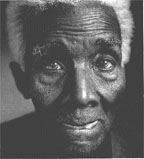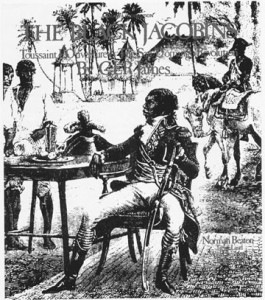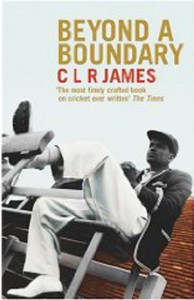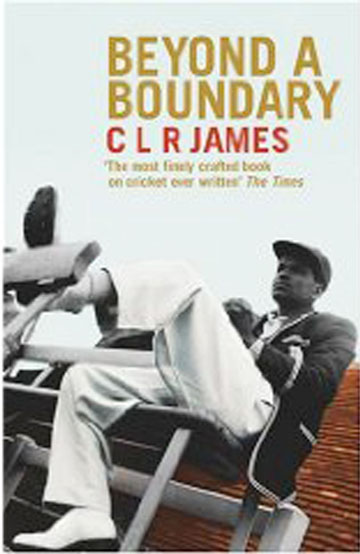CLR James: An outstanding Caribbean intellect
Introduction
CLR James, the Trinidadian scholar, writer, Marxist ideologue and internationalist who spent much of his life abroad in the United Kingdom is not well known to Guyanese and Caribbean people. We have asked Peter Fraser, a Guyanese academic living in the United Kingdom, to write four articles outlining his life and work, his writings, his ideology and his politics.
The first article appears below.

Peter Fraser taught at UWI Trinidad in the 1970s and London University from 1980s to 2001. Previously Research Fellow at London Universities Institute of Commonwealth Studies and Education and at Du Bois Institute at Harvard. Currently Associate Fellow Caribbean studies centre London Metropoli-tan University. Specialises in Social and
political history of the Caribbean, especially migration and intellectual history.
CLR James was the outstanding West Indian intellectual of the twentieth century. He was a pioneer in twentieth century West Indian writing, made a massive contribution to the development of historical writing about the Caribbean, was a leading advocate for the independence of Africa, pushed Marxist theory in directions most Marxists would not contemplate for another two decades, and helped establish the study of sport as an important part of understanding society. In many respects this has been acknowledged. Since his death in 1989 an institute dedicated to the study of his work has been established, another named jointly after him and an African American historian John Henrik Clarke proposed and a number of books and articles, usually of high standard, have been written. The danger now is that James will simply be seen as one of those worthy figures that academics cherish and write about with little relevance to contemporary life, even worse if the correct way to look at James is to see him as a revolutionary Marxist as Robert Hill argues (to be fair to readers I concur with Hill’s interpretation). After all as Brendan de Caires reminds us in a recent review in Stabroek News one popular view of James was that he was wrong about everything. In these articles I hope to show that that particular view is itself simply wrong and that even when he was wrong James was wrong in interesting and important ways. Here I shall deal first with James’s life and work, then his writings, thirdly his ideology and finally with his politics, especially with West Indian politics.


They had all benefited from an attitude to education and the education system in Trinidad. Like other big colonies Trinidad had its elite secondary schools-in Trinidad because of the older and newer coloured and black middle classes these were never quite as racially exclusive as in other British West Indian colonies. Perhaps more important in some respects was the system of teaching training: this had produced J.J.Thomas as well as James’s father. Despite all the failings of an imperial education system it produced in Trinidad and elsewhere in the Empire at its best critical thinkers. How else do we explain in Trinidad alone his exact contemporaries George Padmore (before James the best known West Indian Marxist) and the splendidly named Oliver Cromwell Cox (think of the parents who at a time when governors’ names for children were more common named their child after the regicide). Cox published the first extended Marxist analysis of race relations Caste,Class and Race in 1948 and later wrote analyses of American capitalism. The younger Eric Williams’s Capitalism and Slavery (1944) challenged from a Marxist perspective interpretations of the British campaigns to end the slave trade and slavery. It also produced people who saw in the USA alternatives, either to higher education in Britain (Padmore went there first, Cox’s father encouraged his children to go there), or to jobs there (both Cox and Williams found academic posts there). All except Cox were in Britain together briefly in the late 1930s, along with another remarkable West Indian, W. Arthur Lewis from St. Lucia.
To revert to James. With his ability, his love of reading and good coaching from his father James won one of the four scholarships to Queen’s Royal College, the most prestigious school in Trinidad. By his own account he then decided to educate himself in his own way, much to the disappointment and rage of schoolteachers and his father. He then taught for more than a decade in Trinidad before leaving for England in 1932. While still in Trinidad he was part of a group of writers who published in the Beacon and Trinidad, magazines of limited life and circulation financed by the father of Albert Gomes, later a prominent Trinidadian politician and champion of the steel band and the Spiritual Baptists, at that time persecuted in Trinidad; another member Ralph de Boissiere would go to Australia and publish through a radical publisher two novels on Trinidad Crown Jewel and Rum and Coca Cola. In Beyond A Boundary he alludes to this group. So James and his intellectual contemporaries were already thinking about politics and he himself had begun to write about Captain Cipriani and his working class support: his book on the subject would be published privately in 1932 funded by Learie Constantine and a pamphlet derived from the book focussing on West Indian self-government by a bigger British publisher in 1933. Before leaving Trinidad James saw himself more as a writer-he had published five short stories by 1931 and had the manuscript of his novel Minty Alley completed by 1927-it would be published in Britain in 1936. His play Toussaint L’Ouverture was performed in London in 1936 with Paul Robeson in the leading role. The play was to be his last literary work and the only one wholly written in Britain.
From his arrival in Britain in 1932, at the suggestion of Learie Constantine and with his financial and moral support, James’ life revolved around cricket and politics.
It was an astonishingly productive period. On cricket he wrote for the Port of Spain Gazette, the Manchester Guardian, the Glasgow Herald, as well as in 1932 writing, based on Constantine’s words, the text of Constantine’s Cricket and I (1933). There were also a few interesting articles on his first impressions of Britain for the Gazette. The more important part of his writing was political. He helped form a small Trotskyite group that joined the Independent Labour Party (more radical than the Labour Party) to fight the orthodox Communists(Stalinists). In 1938 he was one of the two British representatives to the meeting founding the Trotskyite Fourth International. When the Communists left the ILP and joined the Labour Party he resisted following Trotsky’s instructions to do the same-there were few Trotskyites but they were wonderfully fractious. Some of his political writing would appear in their publications, but he also wrote for The Keys, the journal of the League of Coloured Peoples, founded by the Jamaican doctor, Harold Moody. When Italy invaded Ethiopia in 1935 he found again his friend George Padmore, a more orthodox Marxist (indeed he had worked for the Communist International but had left the Communists) and they worked together, fruitlessly, to oppose that invasion. The point is that James, then and later, was never a narrow sectarian. To 1938 when he left he published several substantial and important works. World Revolution 1917-1936:The Rise and Fall of the Communist International appeared in 1937, The Black Jacobins: Toussaint L’Ouverture and the San Domingo revolution and A History of Negro Revolt in 1938; he completed his translation of Boris Souvarine’s biography of Stalin-that was published in 1939. In 1938 as perhaps the leading British Trotskyite he was invited to the USA.
His years in the USA from 1938 to 1953 are the ones which appear to be of least interest to a West Indian audience. He continued writing prolifically but much was published in obscure places, especially when he and a small group of like-minded people broke with orthodox Trotskyite positions. The collective works The Invading Socialist Society came out in 1947 and State Capitalism and World Revolution in 1950; his Mariners, Renegades and Castaways, mainly a study of Herman Melville’s Moby Dick, but also containing a memoir of his time in the USA appeared just before he was expelled to Britain. Facing Reality, another collective work belonging to the period and the group came out in 1958. The important Notes on Dialectics written in 1948 would be published in 1965. During his time in the USA James helped organize share-croppers in the Southern US: in this period both in practical and theoretical terms James addressed the problem of what was the best means of workers organizing themselves, without the benefits (which James and his group repudiated) of a Leninist vanguard party. This is perhaps the central issue of modern politics: is democracy, control of government by the majority, really possible?
On his return to England he resumed writing about cricket and began Beyond A Boundary. In 1958 he returned to Trinidad at the invitation of Eric Williams to edit The Nation, the paper of Williams’ People’s National Movement. It was another fruitful period. James was also Secretary of the West Indies Federal Labour Party at the beginning of the short-lived West Indies Federation. It was the first time that James was involved with politics at a national level with a party in government. It was marked by a successful campaign to get Frank Worrell made West Indian cricket captain and a less successful one, which helped to create the breach between Williams and James, for the return of the US base at Chaguaramas to Trinidad. Modern Politics was published in 1960 by the PNM; Party Politics in the West Indies containing James’s criticisms of Williams and others came out in 1962. James returned to Britain with his updated Beyond A Boundary. This was published in 1963 to the appreciation of some and the bemusement of others. This was also his last major work. In 1969 he went to the USA teaching at university level what others described then as Black studies but he always saw the experience of African Americans as an integral part of US history. He continued to write about cricket, history and contemporary politics. Allison and Busby, thanks to the efforts of Margaret Busby, republished much of his work including three collections of his writing- The Future in the Present (1977), Spheres of Existence (1980), and At The Rendezvous of Victory (1984) and in 1977 (revised edition 1982) the only new work Nkrumah and the Ghana Revolution (though this too was really a collection). He died in London in 1989. Four years later what had been intended to be his magnum opus American Civilization was published in an incomplete form, finally allowing us to see what his American experience had meant and the political and ideological lessons he had drawn from this experience.
James was a man of his age and place. This meant that he rejected racial theories. In 1991 at a conference in the US on his work this led to angry denunciations of James’ Eurocentrism-nearly half a century before a friendly critic of his American work had pointed out to him that he overlooked the African cultural elements in African American life. James believed as many of his contemporaries did that to acknowledge cultural difference was to concede the racist case (indeed in 1981 Martin Barker in The New Racism would argue that this was a move that racists were in fact making by substituting culture for race in their arguments). James saw his fellow West Indians and naturally himself as products of Western Civilization. Throughout his life he criticized the failings of Western civilization but did see the remedies for these failings in the development and modification of a Western European ideology-Marxism which he believed had universal application. On the other hand his insistence on understanding what people wanted , listening to what they had to say, to recognize what their cultural preferences are, means that an argument for the centrality of culture can be seen to be jamesian (without the capital letter). What is Jamesian, however, is the belief that analysis and political action cannot be divorced. The man who in the 1980s said he was not a supporter of the Solidarity Movement in Poland but a member remained a revolutionary to the end.

